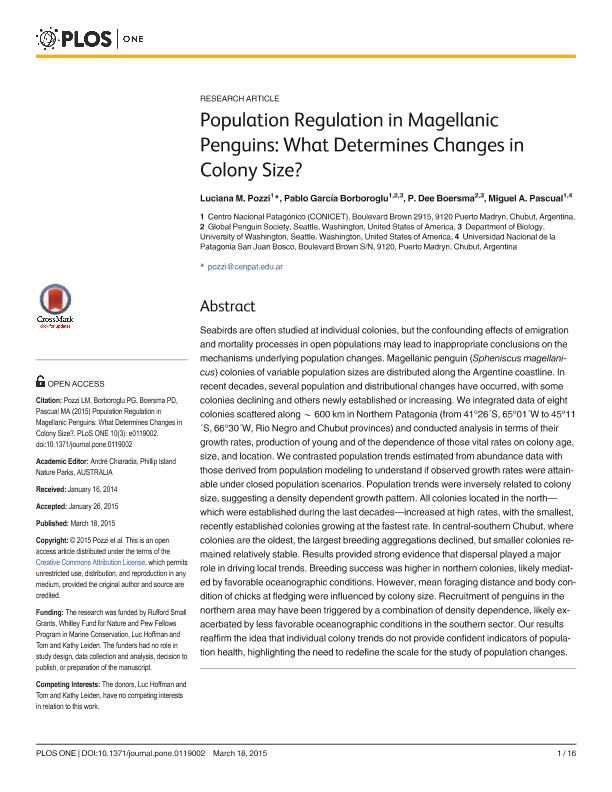Mostrar el registro sencillo del ítem
dc.contributor.author
Pozzi, Luciana Melina

dc.contributor.author
Garcia Borboroglu, Jorge Pablo

dc.contributor.author
Boersma, P. Dee

dc.contributor.author
Pascual, Miguel Alberto

dc.date.available
2017-07-26T21:24:45Z
dc.date.issued
2015-03-18
dc.identifier.citation
Pozzi, Luciana Melina; Garcia Borboroglu, Jorge Pablo; Boersma, P. Dee; Pascual, Miguel Alberto; Population regulation in Magellanic penguins: what determines changes in colony size?; Public Library of Science; Plos One; 10; 3; 18-3-2015; 1-16; e0119002
dc.identifier.uri
http://hdl.handle.net/11336/21409
dc.description.abstract
Seabirds are often studied at individual colonies, but the confounding effects of emigration and mortality processes in open populations may lead to inappropriate conclusions on the mechanisms underlying population changes. Magellanic penguin (Spheniscus magellanicus) colonies of variable population sizes are distributed along the Argentine coastline. In recent decades, several population and distributional changes have occurred, with some colonies declining and others newly established or increasing. We integrated data of eight colonies scattered along ~600 km in Northern Patagonia (from 41°26´S, 65°01´W to 45°11´S, 66°30´W, Rio Negro and Chubut provinces) and conducted analysis in terms of their growth rates, production of young and of the dependence of those vital rates on colony age, size, and location. We contrasted population trends estimated from abundance data with those derived from population modeling to understand if observed growth rates were attainable under closed population scenarios. Population trends were inversely related to colony size, suggesting a density dependent growth pattern. All colonies located in the north — which were established during the last decades — increased at high rates, with the smallest, recently established colonies growing at the fastest rate. In central-southern Chubut, where colonies are the oldest, the largest breeding aggregations declined, but smaller colonies remained relatively stable. Results provided strong evidence that dispersal played a major role in driving local trends. Breeding success was higher in northern colonies, likely mediated by favorable oceanographic conditions. However, mean foraging distance and body condition of chicks at fledging were influenced by colony size. Recruitment of penguins in the northern area may have been triggered by a combination of density dependence, likely exacerbated by less favorable oceanographic conditions in the southern sector. Our results reaffirm the idea that individual colony trends do not provide confident indicators of population health, highlighting the need to redefine the scale for the study of population changes.
dc.format
application/pdf
dc.language.iso
eng
dc.publisher
Public Library of Science

dc.rights
info:eu-repo/semantics/openAccess
dc.rights.uri
https://creativecommons.org/licenses/by/2.5/ar/
dc.subject
Magellanic Penguin
dc.subject
Colony Size
dc.subject
Population Regulation
dc.subject
Patagonia
dc.subject.classification
Ecología

dc.subject.classification
Ciencias Biológicas

dc.subject.classification
CIENCIAS NATURALES Y EXACTAS

dc.title
Population regulation in Magellanic penguins: what determines changes in colony size?
dc.type
info:eu-repo/semantics/article
dc.type
info:ar-repo/semantics/artículo
dc.type
info:eu-repo/semantics/publishedVersion
dc.date.updated
2017-07-13T14:01:19Z
dc.identifier.eissn
1932-6203
dc.journal.volume
10
dc.journal.number
3
dc.journal.pagination
1-16; e0119002
dc.journal.pais
Estados Unidos

dc.journal.ciudad
San Francisco
dc.description.fil
Fil: Pozzi, Luciana Melina. Consejo Nacional de Investigaciones Científicas y Técnicas. Centro Nacional Patagónico; Argentina
dc.description.fil
Fil: Garcia Borboroglu, Jorge Pablo. Consejo Nacional de Investigaciones Científicas y Técnicas. Centro Nacional Patagónico; Argentina. Global Penguin Society. Washington; Estados Unidos. University of Washington; Estados Unidos
dc.description.fil
Fil: Boersma, P. Dee. Global Penguin Society. Washington; Estados Unidos. University of Washington; Estados Unidos
dc.description.fil
Fil: Pascual, Miguel Alberto. Consejo Nacional de Investigaciones Científicas y Técnicas. Centro Nacional Patagónico; Argentina. Universidad Nacional de la Patagonia; Argentina
dc.journal.title
Plos One

dc.relation.alternativeid
info:eu-repo/semantics/altIdentifier/doi/http://dx.doi.org/10.1371/journal.pone.0119002
dc.relation.alternativeid
info:eu-repo/semantics/altIdentifier/url/http://journals.plos.org/plosone/article?id=10.1371/journal.pone.0119002
Archivos asociados
